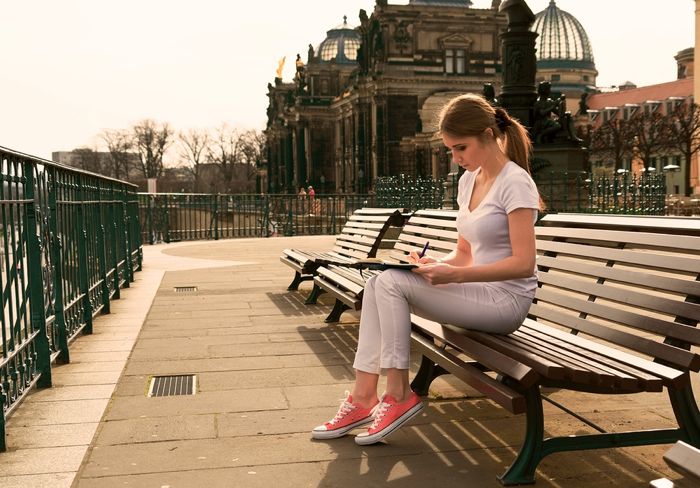For the best writing productivity, we all need a balance of routine and novelty.
But how do we get it?
When I was a kid, one of my favorite things to do was to change the furniture around in my room.
I’d take an hour or so, close the door, and proceed to change my little world. The bed against the opposite wall, the dresser over there instead, this picture down, another picture up, the desk in that corner, etc. When I was finished, I’d sit down and just exist in the new space I’d created.
For weeks after that I would feel like a new person. That simple change was enough to make everything in life look a little different, and a little brighter.
We all need change in our lives, but creative people need it perhaps more than most. On the other hand, we need our routines. A regular daily writing time really helps stack up those pages.
How are we to find the right balance between the two so that we’re most productive?
 Routine and N0velty: Which is Necessary for Writers and Creatives?
Routine and N0velty: Which is Necessary for Writers and Creatives?
Humans have an amazing ability to cling to their habits. Think about how you brush your teeth. When was the last time you changed your process? Or how you drive to work, or fix your hair, or get dressed in the morning?
Habits are often good things. Once established, they allow us to do our daily activities with less brainpower, giving us mental space to work on other things, like the next chapter of a novel.
We can use our tendency to be habitual to our advantage when it comes to being creative. If you can find a regular writing time and stick to it long enough to make it a habit, your body and mind will help you out. When it’s time to write, you’ll head that direction naturally, because your system is primed for the task.
Once your writing time is locked into your schedule, it will be hard to resist, and that’s a great thing because it makes you more productive.
But no matter how successful your writing routine is for you, there is a danger of falling into a rut. Doing the same thing in the same way for too long means you’re missing out on a critical component of creativity: novelty.
 Routine and Novelty: Sometimes You Have to Shake It Up
Routine and Novelty: Sometimes You Have to Shake It Up
“Creativity is doing things in novel and unexpected ways,” says musician Sam Brinson. “How can we be creative when our lives fail to follow that same principle? If what we do with the time given to us is predictable and repetitive, all we will ever create will follow suit.”
A 2012 study reported that unusual experiences may be critical for creative development. Researchers conducted an experiment in which participants engaged in virtual reality. The first group experienced unusual and unexpected events, while the second group experienced more normal events.
Results showed that the unusual experiences increased “cognitive flexibility” or creativity more than the normal experiences.
We’ve all heard about creative breakthroughs that followed novel or unusual experiences. Walt Disney didn’t imagine all he could do with animation until he saw his advertising illustrations projected onto a screen in a movie theater. Coca-Cola was supposed to be a medical remedy for headaches until its creator dumped a bunch of ingredients together.
Naval engineer Richard James was developing industrial equipment stabilizers in 1943 when he knocked one down and watched it do its slinky walk off his shelf. When he showed his wife, she saw its potential as a toy, and the Slinky was born.
Our brains are lazy, at the core. They establish neural connections and then use them like major highways to supply our everyday thinking power.
“In order to think creatively,” writes Gregory Berns, author of Iconoclast, “you must develop new neural pathways and break out of the cycle of experience-dependent categorization….For most people, this does not come naturally. Often, the harder you try to think differently, the more rigid the categories become.”
New experiences force the brain out of its habit of relying on neural shortcuts.
“Are you attempting to unleash creativity through familiar, comfortable pathways?” writes Dr. Robyn McMaster, Sr. VP of the MITA International Brain Center and author of Brain Based Biz. “If so you’re only human—but remember that creativity thrives on novelty.”
 Even Small Changes Can Spur Big Ideas
Even Small Changes Can Spur Big Ideas
Yes, we need our routines, but we also need to get away from the norm every once in awhile to shake things up. The good news is that we don’t have to get crazy.
The same researchers from the study on virtual reality above conducted a second test that showed novelty need not be extreme or expensive to be effective.
They directed the first group of participants to prepare a typical sandwich in the usual way, and a second group to mix up the order of steps. (Think jelly first on the bread instead of peanut butter.)
The people who made the sandwiches in the unusual way scored higher on cognitive flexibility than the people who made it like they always did.
“These results also suggest that if you want to get into a creative mindset, do your normal routine in a completely different way,” says Scott Barry Kaufman, Scientific Director of The Imagination Institute in the Positive Psychology Center at the University of Pennsylvania and Co-Founder of The Creativity Post. “Write with your other hand. Moonwalk backwards on your way to work. Eat something new for lunch. Smile at strangers. Be weird. With your brain re-shuffled, you’ll be in a better position to be creative.”
Routine and Novelty: 7 Ways to Shake Up Your Writing Routine
With these ideas in mind, below are seven ways you can inject some novelty into your writing routine without abandoning its benefits.
 1. Change Your Work Space
1. Change Your Work Space
No matter where you write, simply change it up. Move the furniture around, or get a new piece of furniture. Try some new paintings on the wall, or a new color of paint. Give yourself something new to look at when you walk in the door. Turn your writing chair around and face a different direction.
Another option: Take your laptop and go mobile for a week. Write at libraries, cafes, parks. Follow your whims and have fun.
 2. Switch Up Your Process
2. Switch Up Your Process
If you feel you’re in a rut, you may want to make more dramatic changes to your current routine. If you write in the morning, try afternoon or evening instead. Set up a different pre-writing ritual.
Maybe you should take a walk beforehand, for example, or make a cup of tea instead of coffee. You might read from the works of some authors you admire, talk out your ideas for the scene into a voice recorder, or outline the scene before writing it.
Think of new ways to approach your daily writing time. How can you make it more interesting?
 Routine and Novelty 3. Try Jumping Around
Routine and Novelty 3. Try Jumping Around
If you usually write chronologically, try writing whatever scene appeals to you instead. Maybe you’re in the mood to work on the ending, or the climactic scene. You can work up to it later. Or maybe if you usually jump around, it’s time to work scene by scene.
Try writing a chapter from the inside out. Break it up into more scenes. Start in the middle and then fill in the beginning and end.
 4. Revisit an Old Dream
4. Revisit an Old Dream
What have you wanted to do but haven’t had a chance to, yet? Just talking about this other dream or wish—even if it’s not writing related—can help jerk you out of your usual thinking ruts. Type out what your dream is and how it would make you feel, or talk to a good friend who is likely to encourage you.
Maybe you’ve wanted to start a podcast, begin an online magazine, try your hand at writing in another genre, or add graphic design to your writing capabilities. Whatever it is, allow yourself to think about it and imagine how you might make it happen. Even if you don’t pursue it, it will help put your brain into “possibility” mode, energizing your creative powers.
 5. Travel
5. Travel
Going somewhere new is always a good way to introduce your mind to new things. It doesn’t have to be an exotic trip. Anywhere you haven’t seen yet will do. Imagine your new location as a setting for a scene in your novel, or let it spark the beginning of a new short story or poem.
Last summer, for example, I took a 30-minute trip to a nearby crater I’d never heard of until I looked up area trails and hikes. It was absolutely amazing—this giant hole in the ground hidden from view by a couple hills. I not only learned something, I got some exercise in the process, and saw the valley in which I live from a whole new perspective. I wouldn’t be surprised if one day that crater shows up in my writing.
 Routine and Novelty 6. Learn Something New
Routine and Novelty 6. Learn Something New
Sign up for a class in your local area, or find one online. Learning something new is always exciting and stimulating for your brain, and can help you come up with new ideas. Try learning more about designing your website, characterization, self-publishing, or something totally unrelated to writing, like playing a musical instrument or riding a horse.
Change your routine to include educational activities as well as writing. Allow what you learn to inspire and motivate you.
 7. Meet New People
7. Meet New People
New people can energize us, especially if they’re ambitious, energizing folks. Old friends are wonderful, but to inject a bit more novelty into your life, try meeting someone new. Just one night of exchanging new ideas can be enough to get your brain spinning in new directions.
How you do it doesn’t matter. Maybe a friend introduces you, you go to a writer’s conference, or you join a sports team. Maybe you and some writing friends can get together somewhere to write once a week.
Don’t Change It If It’s Working
Finally, if your routine is working for you, don’t feel you have to change it. Just be on the look out for signs that your writing is getting dull, or your creative muse is bored. If you’re skipping your writing time, for example, or feeling negative about your work, it may be time to shake it up.
How do you shake up your writing routine?
Sources
Sam Brinson, “Creativity Accelerators: Novelty, Unpredictability and Complexity,” DIY Genius, October 23, 2014, https://www.diygenius.com/creativity-accelerators/.
Simone M. Ritter, “Diversifying experiences enhance cognitive flexibility,” Journal of Experimental Social Psychology, July 2012; 48(4):961-964, http://www.sciencedirect.com/science/article/pii/S0022103112000212.
Scott Barry Kaufman, “Why Weird Experiences Boost Creativity,” The Creativity Post, June 20, 2012, http://www.creativitypost.com/psychology/why_weird_experiences_boost_creativity.
Gregory Burns, “Neuroscience Sheds New Light on Creativity,” FastCompany.com, October 1, 2008, http://www.fastcompany.com/1007044/neuroscience-sheds-new-light-creativity.
Dr. Robyn McMaster, “The 8 Types of Creative Intelligence,” Lateral Action, December 2009, http://lateralaction.com/articles/multiple-intelligences/.


I find myself shaking things up in my writing by giving my characters talents or challenges that I have never had. Then, I have to go learn about it. My main character gets involved in the martial arts; I’ve never done that. So off I went to research, and then to try it myself. My back issues keep me from getting too involved. I can’t do the Taekwondo that my hero does, but I found out that I could do Tai Chi. And Tai Chi is now part of my new routine. I also love to visit new places and put my character there to see how and what he will do. And I also move things around now and then in my writing nook – it really does have a positive effect. Thank you so much for this great article, gives me confirmation that I’m doing things somewhat positive in my shake-rattle-and-roll ideas.
Ha ha. Shake, rattle, and roll! Sounds good to me, Sharon. I know the tai chi is wonderful for writers or for anyone spending a lot of time standing or sitting. And moving things around is so simple, but it makes such a difference. Love what you’re doing with your characters. I’ve done that a few times, too, and it really takes you out of your comfort zone. Fun. :O)
I took a leap and started writing fan fiction short stories about some of my favorite childhood characters. It’s helped a lot with the novel I’m working on. In the process, I rediscovered the joy and excitement of writing.
Sounds like a neat idea, Lynnette. Thanks for sharing!
I’d add get out of your comfort zone. And learn something new at the same time. In Cheyenne WY, the local police department offers a 10-week citizens policy academy. I haven’t had any experience with law enforcement except for a traffic warning so I thought this might be interesting. Boy, has it! Last night I went on a ride-along with one of the night shift officers. I’ve never seen anyone booked into the local jail for public intoxication, or how a totally drunken person behaves, or even how the jail works, so I asked questions of the officer and the jail employees. I have whole new experiences now that I can use in my writing. In the past, it would never have occurred to me to set a scene in the county jail. Well, now I can. By getting out of your comfort zone, you’ll gain new insights for your writing and into life.
Great suggestion, Deborah! And good for you–that sounds like a fantastic experience. I can imagine how much it would help your writing.
I shook up my writing routine by sticking with NaNoWriMo this year. I’ll make my 50,000 words sometime today. Hopefully I can turn that commitment into a daily writing routine of one or two one-hour sessions. That will leave me time to try a fun 2018 project of doing one completely new thing each week. Should be fun!
Congrats on winning NanWriMo, Pat! That’s awesome. One completely new thing each week sounds fun!